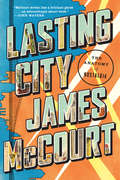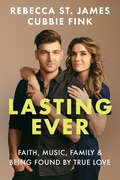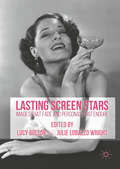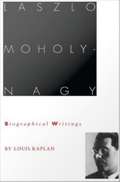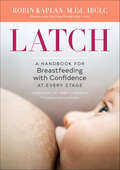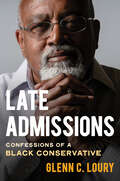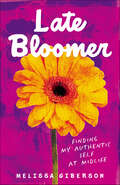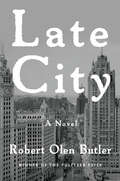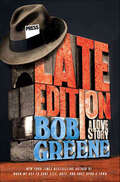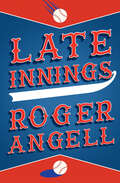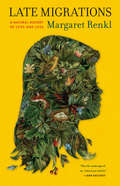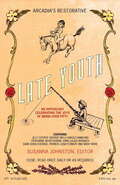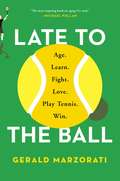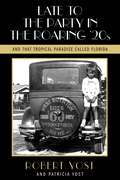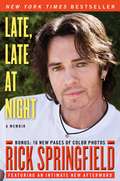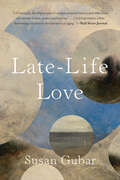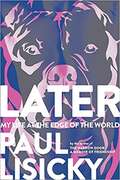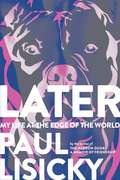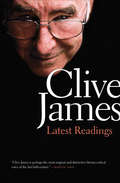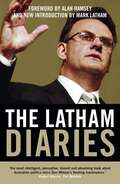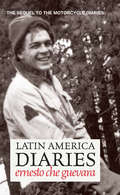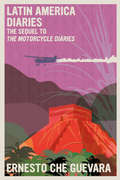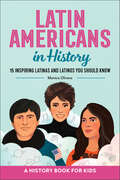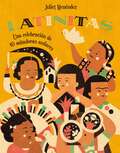- Table View
- List View
Lasting City: The Anatomy of Nostalgia
by James MccourtThe darkly intense Irish-American family drama come alive like never before in this "virtuosic meta-memoir" (Publishers Weekly, starred review). "The blood-red of Manhattan, the brilliant green of an Irish-American wake, the blue-rinsed divas of the opera and the bathhouse alike" (Michael Gorra) are hypnotically rendered in this "astoundingly smart book" (John Waters). With some of the most lyrical cadences in recent literature, the legendary James McCourt animates twentieth-century New York through a "kaleidoscope of sharp-edged, brilliantly colored memories" (J. D. McClatchy) and with "dynamic prose and high-brow erudition that has gone the way of the dodo" (Publishers Weekly). Braiding a nostalgic portrait of the eternal city with a boy's funny, guttersnipe precocity and outrageous coming-of-age in the 1940s and 1950s, McCourt revisits the fantasy city of his youth with Proustian memories of steam calliopes in Central Park, Hiroshima "obliterated in a flash of light," and closing his mother's eyes for the last time. As sensational as it is satisfying, Lasting City, a profoundly American work, identifies the spot where genius and madness meet.
Lasting Ever: Faith, Music, Family, and Being Found by True Love
by Rebecca St. James Cubbie FinkMarried couple and award-winning musical artists Rebecca St. James and Cubbie Fink share powerful stories of faith from their family's journey to encourage you and draw you closer to God. With authentic storytelling and hard-won wisdom, Rebecca St. James and Cubbie Fink illuminate the heartaches and triumphs that have shaped their story as a married couple, as parents, as musicians, and—most of all—as Jesus followers. Journey with Cubbie and Rebecca and discover hope for your own story as they wrestle through questions like: How does God redeem life&’s big losses, like miscarriage, betrayal, and other traumatic experiences? How do we find true and healthy identity outside of what we do and what people think of us? How can we best honor our marriage and love our family well through seasons of great hardship? On the mountaintops and in the valleys, how do we discover an unwavering commitment to God that is lasting ever? Through honest conversations about singlehood, marriage, the purity movement, and living in the spotlight, Lasting Ever offers hope to all of us who face challenges but long to embrace life with a heart attuned to God&’s grace.
Lasting Screen Stars
by Lucy Bolton Julie Lobalzo WrightLasting Stars examines the issue of stardom and longevity and investigates the many reasons for the persistence or disappearance of different star personas. Through a selection of chapters that look at issues such as inappropriate ageing, national identity and physical characteristics, this book will be the first volume to consider in depth and breadth the factors that affect the longevity of film stardom. The range of stars includes popular stars who are approached from fresh angles (Brando, Loren), less popular stars whose lower-profiles than their peers may be surprising (Taylor, Shearer) and stars whose national identity is integral to their perception as they age (Riva, Bachchan, Pavor). There are stars from the beginning of Hollywood (Valentino, Reid) to the present day (Jolie), and those who made uneasy transitions between countries (Mason), ages (Ringwald) and industrial eras (Keaton). The book examines the range of factors that affect how star images endure, including appropriate and inappropriate ageing (Griffith), race (Ice Cube) and digital technologies (Lee).
Laszlo Moholy-Nagy: Biographical Writings
by Louis KaplanMarking the centenary of the birth of Laszlo Moholy-Nagy (1895-1946), this book offers a new approach to the Bauhaus artist and theorist's multifaceted life and work--an approach that redefines the very idea of biographical writing. In Laszlo Moholy-Nagy, Louis Kaplan applies the Derridean deconstructivist model of the "signature effect" to an intellectual biography of a Constructivist artist. Inhabiting the borderline between life and work, the book demonstrates how the signature inscribed by "Moholy" operates in a double space, interweaving signified object and signifying matter, autobiography and auto-graphy. Through interpretative readings of over twenty key artistic and photographic works, Kaplan graphically illustrates Moholy's signature effect in action. He shows how this effect plays itself out in the complex of relations between artistic originality and plagiarism, between authorial identity and anonymity, as well as in the problematic status of the work of art in the age of technical reproduction. In this way, the book reveals how Moholy's artistic practice anticipates many of the issues of postmodernist debate and thus has particular relevance today. Consequently, Kaplan clarifies the relationship between avant-garde Constructivism and contemporary deconstruction. This new and innovative configuration of biography catalyzed by the life writing of Moholy-Nagy will be of critical interest to artists and writers, literary theorists, and art historians.
Latch: A Handbook for Breastfeeding with Confidence at Every Stage
by Robin KaplanLatch is a judgment-free guide to breastfeeding that will teach you exactly what you need to know to meet your own personal breastfeeding goals.Early motherhood is a time of great joy. It can also be filled with new stressors—chief among them: breastfeeding. In Latch: A Handbook for Breastfeeding with Confidence at Every Stage, International Board-Certified Lactation Consultant, Robin Kaplan, addresses specific breastfeeding concerns, allowing you to feel empowered while breastfeeding and overcome challenges as they arise. After working with countless mothers who have felt unique in their breastfeeding challenges, and as the mother of two who overcame breastfeeding challenges of her own, she knows how deeply personal breastfeeding is.Compassionate and supportive, Latch covers the most pressing topics at each stage of breastfeeding and will teach you to:Establish successful breastfeeding early on with attention to breastfeeding positions, latch, mom's wellbeing, milk supply, supplementation, and pumpingBreastfeed through lifestyle changes such as returning to work, transitioning to bottle-feeding, supplementation, reducing nighttime feedings, and introducing solidsWean your baby/toddler from breastfeeding including emotional preparation, reducing feedings, and guidance for when your child tries to nurse againComplete with breastfeeding stories from new moms, breastmilk storage guidelines, and resources for additional breastfeeding support Latch will be there for you, holding your hand, every step of the way.
Late Admissions: Confessions of a Black Conservative
by Glenn LouryA shockingly frank memoir from a prize-winning economist, reflecting on his remarkable personal odyssey and his changing positions on identity, race, and belief. Economist Glenn C. Loury is one of the most prominent public intellectuals of our time: he’s often radically opposed to the political mainstream, and delights in upending what’s expected of a Black public figure. But more so than the arguments themselves—on affirmative action, institutional racism, Trumpism—his public life has been characterized by fearlessness and a willingness to recalibrate strongly held and forcefully argued beliefs. Loury grew up on the south side of Chicago, earned a PhD in MIT’s economics program, and became the first Black tenured professor of economics at Harvard at the age of thirty-three. He has been, at turns, a young father, a drug addict, an adulterer, a psychiatric patient, a born-again Christian, a lapsed born-again Christian, a Black Reaganite who has swung from the right to the left and back again. In Late Admissions, Loury examines what it means to chart a sense of self over the course of a tempestuous, but well-considered, life.
Late Bloomer: Finding My Authentic Self at Midlife
by Melissa GibersonMelissa is a middle-aged suburban wife and mother, firmly rooted in the life she’s always wanted. Yet she longs for something more—something she can’t quite put her finger on. When she finds herself mesmerized by the sight of a woman, she asks herself for the first time: Am I gay? This question sends Melissa on a head-spinning journey of self-discovery, one that challenges everything she thinks she knows about herself. Torn between her desire to be true to herself and her desire to protect her children, she’s consumed by fear and conflicting emotions. Adrift in uncharted waters, Melissa finds fragments of understanding and peace in unexpected places that help her deconstruct her preconceptions about faith and identity, and she begins to construct a new framework for her life. Throughout her journey, she finds hope, love, and the courage to persevere.
Late City: A Novel
by Robert Olen ButlerThe Pulitzer Prize–winning author shares an “exceptionally nuanced, tender, funny, tragic, and utterly transfixing portrait” of one man’s troubled century (Booklist, starred review).At 115 years old, former newspaperman Sam Cunningham is also the last surviving veteran of World War I. As he prepares to die in a Chicago nursing home, the results of the 2016 presidential election come in—and he finds himself in a wide-ranging conversation with a surprising God. As the two review Sam’s life, the grand epic of the twentieth century comes sharply into focus.Sam grows up in Louisiana under the flawed morality of an abusive father. Eager to escape, Sam enlists in the army while still underage. Though the hardness his father instilled in him helps him make it out of World War I alive, it also prevents him from contending with the emotional wounds of war. Back in the United States, Sam moves to Chicago to begin a career as a newspaperman that will bring him close to the major historical turns of the twentieth century. There he meets his wife and has a son, whose fate counters Sam’s at almost every turn.As he contemplates his relationships—with his parents, his brothers in arms, his wife, his editor, and most importantly, his son—Sam is amazed at what he still has left to learn about himself after all these years.
Late Edition: A Love Story
by Bob GreeneA loving and laughter-filled trip back to a lost American time when the newspaper business was the happiest game in town.In a warm, affectionate true-life tale, New York Times bestselling author Bob Greene (When We Get to Surf City, Duty, Once Upon a Town) travels back to a place where—when little more than a boy—he had the grand good luck to find himself surrounded by a brotherhood and sisterhood of wayward misfits who, on the mezzanine of a Midwestern building, put out a daily newspaper that didn't even know it had already started to die."In some American cities," Greene writes, "famous journalists at mighty and world-renowned papers changed the course of history with their reporting." But at the Columbus Citizen-Journal, there was a willful rejection of grandeur—these were overworked reporters and snazzy sportswriters, nerve-frazzled editors and insult-spewing photographers, who found pure joy in the fact that, each morning, they awakened to realize: "I get to go down to the paper again."At least that is how it seemed in the eyes of the novice copyboy who saw romance in every grungy pastepot, a symphony in the song of every creaking typewriter. With current-day developments in the American newspaper industry so grim and dreary, Late Edition is a Valentine to an era that was gleefully cocky and seemingly free from care, a wonderful story as bracing and welcome as the sound of a rolled-up paper thumping onto the front stoop just after dawn.
Late Innings
by Roger AngellThe acclaimed New Yorker sportswriter examines the inner working of professional baseball, in these essays from the spring of 1977 to the summer of 1981.Late Innings takes fans far beyond the stadium view of the field and into the substrata of baseball as it is experienced by the people who make it happen. Celebrated as one of the game&’s finest chroniclers, Roger Angell shares his commentary on the money, fame, power, traditions, and social aspects of baseball during the late seventies and early eighties. Covering monumental events such as Reggie Jackson&’s three World Series home runs and the bitter ordeal of the 1981 players&’ strike, Angell offers a timeless perspective on the world of baseball to be enjoyed by fans of all ages.
Late Migrations: A Natural History of Love and Loss
by Margaret RenklFrom the New York Times columnist, a portrait of a family and the cycles of joy and grief that mark the natural world: “Has the makings of an American classic.” —Ann Patchett Growing up in Alabama, Margaret Renkl was a devoted reader, an explorer of riverbeds and red-dirt roads, and a fiercely loved daughter. Here, in brief essays, she traces a tender and honest portrait of her complicated parents—her exuberant, creative mother; her steady, supportive father—and of the bittersweet moments that accompany a child’s transition to caregiver.And here, braided into the overall narrative, Renkl offers observations on the world surrounding her suburban Nashville home. Ringing with rapture and heartache, these essays convey the dignity of bluebirds and rat snakes, monarch butterflies and native bees. As these two threads haunt and harmonize with each other, Renkl suggests that there is astonishment to be found in common things: in what seems ordinary, in what we all share. For in both worlds—the natural one and our own—“the shadow side of love is always loss, and grief is only love’s own twin.”Gorgeously illustrated by the author’s brother, Billy Renkl, Late Migrations is an assured and memorable debut.“Magnificent . . . Readers will savor each page and the many gems of wisdom they contain.” —Publishers Weekly (starred review)
Late Youth: An Anthology Celebrating the Joys of Being Over Fifty
by Susanna JohnstonA Who's Who of Ab Fab over-50s (and their pets, pet hates, wines, menus, travels, cliches, rants, ravings, songs, dances, films, books, fairy tales, passions, villains, recipes, Shangri-Las, sports, collections and liaisons dangereuses...which keep them young!) Contributors include: Arabella Boxer, Viscountess Boxman, Jilly Cooper, John Chancellor, John Hopkins, Francis King, George Melly, Ann Tree, Sir Peregrine Worthsthorne, Nigel Ryan, John Stefanidis, David Plante, Angela Huth, Jane Howard and Maureen Cleave.
Late Youth: An Anthology Celebrating the Joys of Being Over Fifty
by Susanna JohnstonA Who's Who of Ab Fab over-50s (and their pets, pet hates, wines, menus, travels, cliches, rants, ravings, songs, dances, films, books, fairy tales, passions, villains, recipes, Shangri-Las, sports, collections and liaisons dangereuses...which keep them young!) Contributors include: Arabella Boxer, Viscountess Boxman, Jilly Cooper, John Chancellor, John Hopkins, Francis King, George Melly, Ann Tree, Sir Peregrine Worthsthorne, Nigel Ryan, John Stefanidis, David Plante, Angela Huth, Jane Howard and Maureen Cleave.
Late to the Ball: A Journey into Tennis and Aging
by Gerald MarzoratiAn award-winning author attempts to become a nationally competitive tennis player—at the age of sixty—in this “soulful meditation on aging, companionship, and the power of self-improvement” (The Wall Street Journal).Being a man or a woman in your early sixties is different than it was a generation or two ago, at least for the more fortunate of us. We aren’t old…yet. But we sense it coming: Careers are winding down, kids are gone, parents are dying (friends, too), and our bodies are no longer youthful or even middle-aged. Learning to play tennis in your fifties is no small feat, but becoming a serious, competitive tennis player at the age of sixty is a whole other matter. It requires training the body to defy age, and to methodically build one’s game—the strokework, footwork, strategy, and mental toughness. Gerry Mazorati had the strong desire to lead an examined physical life, to push his body into the “encore” of middle age. In Late to the Ball Mazorati writes vividly about his difficulties, frustrations, and triumphs of becoming a seriously good tennis player. He takes on his quest with complete vigor and absolute determination to see it through, providing a rich, vicarious experience, involving the science of aging, his existential battle with time, and the beautiful, mysterious game of tennis. “Enjoyable…crisp and clean” (Publishers Weekly), Late to the Ball is also captivating evidence that the rest of the Baby Boomer generation, now between middle age and old age, can find their own quest and do the same.
Late to the Party in the Roaring Twenties and That Tropical Paradise Called Florida
by Robert Yost Patricia YostMillions of dollars were flooding into Florida's economy in the Roaring Twenties. By 1925, real estate transactions were taking place faster than county clerks could record them. Land sales had virtually eclipsed tourism and farming as the state's source of astounding economic growth. It was no different from other frenetic manias - the people who jumped in early, and got out early, were the winners. Those late to the game were the dreamers.
Late, Late at Night: A Memoir
by Rick SpringfieldIn a searingly candid memoir which he authored himself, Grammy Award-winning pop icon Rick Springfield pulls back the curtain on his image as a bright, shiny, happy performer to share the startling story of his rise and fall and rise in music, film, and television and his lifelong battle with depression. In the 1980s, singer-songwriter and actor Rick Springfield seemed to have it all: a megahit single in “Jessie’s Girl,” sold-out concert tours, follow-up hits that sold more than 17 million albums and became the pop soundtrack for an entire generation, and 12 million daily viewers who avidly tuned in to General Hospital to swoon over his portrayal of the handsome Dr. Noah Drake. Yet lurking behind his success as a pop star and soap opera heartthrob and his unstoppable drive was a moody, somber, and dark soul, one filled with depression and insecurity. In Late, Late at Night, the memoir his millions of fans have been waiting for, Rick takes readers inside the highs and lows of his extraordinary life. By turns winningly funny and heartbreakingly sad, every page resonates with Rick’s witty, wry, self-deprecating, brutally honest voice. On one level, he reveals the inside story of his ride to the top of the entertainment world. On a second, deeper level, he recounts with unsparing candor the forces that have driven his life, including his longtime battle with depression and thoughts of suicide, the shattering death of his father, and his decision to drop out at the absolute peak of fame. Having finally found a more stable equilibrium, Rick’s story is ultimately a positive one, deeply informed by his passion for creative expression through his music, a deep love of his wife of twenty-six years and their two sons, and his life-long quest for spiritual peace.
Late-Life Love: A Memoir
by Susan Gubar“Winning [and] intelligent. . . . [An] impressive, often heartening addition to the literature of aging.” — Heller McAlpin, Wall Street Journal In this “unique blend of memoir and literary commentary” (Bookpage), acclaimed author and literary scholar Susan Gubar contemplates the beauty and strength of enduring love—both for her husband and for the literature that has shaped her life. Throughout the complications of devoted caregiving, her own ongoing cancer treatments, and a stressful move to a more manageable apartment, Gubar proves that love and desire have no expiration date—on the page or in life. Late-Life Love offers a resounding retort to ageist stereotypes, appraises the obstacles unique to senior couples, and celebrates second chances.
Later: My Life at the Edge of The World
by Paul LisickyA stunning portrait of community, identity, and sexuality by the critically acclaimed author of The Narrow Door <p><p> When Paul Lisicky arrived in Provincetown in the early 1990s, he was leaving behind a history of family trauma to live in a place outside of time, known for its values of inclusion, acceptance, and art. In this idyllic haven, Lisicky searches for love and connection and comes into his own as he finds a sense of belonging. At the same time, the center of this community is consumed by the AIDS crisis, and the very structure of town life is being rewired out of necessity: What might this utopia look like during a time of dystopia? <p><p> Later dramatizes a spectacular yet ravaged place and a unique era when more fully becoming one’s self collided with the realization that ongoingness couldn’t be taken for granted, and staying alive from moment to moment exacted absolute attention. Following the success of his acclaimed memoir, The Narrow Door, Lisicky fearlessly explores the body, queerness, love, illness, community, and belonging in this masterful, ingenious new book.
Later: My Life at the Edge of the World
by Paul LisickyA stunning portrait of community, identity, and sexuality by the critically acclaimed author of The Narrow DoorWhen Paul Lisicky arrived in Provincetown in the early 1990s, he was leaving behind a history of family trauma to live in a place outside of time, known for its values of inclusion, acceptance, and art. In this idyllic haven, Lisicky searches for love and connection and comes into his own as he finds a sense of belonging. At the same time, the center of this community is consumed by the AIDS crisis, and the very structure of town life is being rewired out of necessity: What might this utopia look like during a time of dystopia? Later dramatizes a spectacular yet ravaged place and a unique era when more fully becoming one’s self collided with the realization that ongoingness couldn’t be taken for granted, and staying alive from moment to moment exacted absolute attention. Following the success of his acclaimed memoir, The Narrow Door, Lisicky fearlessly explores the body, queerness, love, illness, community, and belonging in this masterful, ingenious new book.
Latest Readings
by Clive James&“[A] collection of Clive James&’s essays on a variety of literary topics . . . This is sanity, humor and acuity in the face of death&” (The Wall Street Journal). In 2010, Clive James was diagnosed with terminal leukemia. Deciding that &“if you don&’t know the exact moment when the lights will go out, you might as well read until they do,&” James moved his library to his Cambridge house, where he would &“live, read, and perhaps even write.&” James is the award-winning author of dozens of works of literary criticism, poetry, and history, and this volume contains his reflections on what may well be his last reading list. A look at some of James&’s old favorites as well as some of his recent discoveries, this book also offers a revealing look at the author himself, sharing his evocative musings on literature and family, and on living and dying. As thoughtful and erudite as the works of Alberto Manguel, and as moving and inspiring as Randy Pausch&’s The Last Lecture and Will Schwalbe&’s The End of Your Life Book Club, this valediction to James&’s lifelong engagement with the written word is a captivating valentine from one of the great literary minds of our time. &“These essays and poems are death-haunted but radiant with the felt experience of what it means to be alive, even when mortally sick, especially when mortally sick.&” —Financial Times &“Latest Readings is a plain demonstration that Mr. James remains as learned and as funny as any critic on earth.&” —The New York Times
Latham Diaries
by Mark LathamHere are the political diaries of one of Australia's most promising national leaders—published within twelve months of his resignation from office—an historic first. The Latham Diaries are searingly honest bulletins from the front line of Labor politics. They provide a unique view into the life of a man, the Party and the nation at a crucial time in Australian history.Mark Latham resigned from parliament in January 2005, after only fourteen months as Leader of the Opposition, amid bitter post-election recrimination and his own ill health. From the beginning of his career he was viewed by many observers as the ALP's resident intellectual and larrikin, the great hope of a new generation with the drive and talent to become prime minister.So why did his career end so abruptly? As The Latham Diaries reveal, the rising tide of public cynicism about politics, the cult of celebrity, the dangerous liaison between politics and the media, and the sickness at the heart of the Labor machine all played their part. As did Latham's own errors, as he candidly records in these diaries.This is a riveting chronicle of life inside politics: the backroom deals, the frontroom conniving, the bitter defeat of idealism and the triumph of opportunism. The Latham Diaries is not just the story of the Labor Party in the last years of the twentieth century and the early twenty-first century, but a sobering account of the state of Australian democracy 100 years after Federation.
Latin America Diaries
by Ernesto Che Guevara"A wonderful glimpse into the maturing mind of a great man and a vital companion to the previous Che diaries."-Michael McCaughan, The Irish Times"Guevara . . . chronicles labor uprisings and resistance against the influences and interests of the US and its intelligence operations. Guevara's passions for history, archaeology, and science are also apparent in this absorbing glimpse of the development of a legendary revolutionary figure."-Vanessa Bush, Booklist"This second volume of travel diaries by revolutionary icon Guevara (after Motorcycle Diaries) shows the 25-year-old rebel wandering around South America in the latter half of 1953."-Publishers WeeklyThis sequel to The Motorcycle Diaries includes letters, poetry, and journalism that document Ernesto Che Guevara's second Latin American journey following his graduation from medical school. After traveling through Bolivia, Peru, Ecuador, and Central America, Ernesto witnesses the 1954 US-inspired coup in Guatemala. He flees to Mexico where he encounters Fidel Castro, marking the beginning of a political partnership that profoundly changes the world and Che himself.This new, expanded edition has been fully revised especially for Ocean Press by Che's widow Aleida March, meticulously correcting her own work of checking Che's handwriting. Includes thirty-two pages of unpublished photos, including photos taken by Che's son Ernesto as he retraces his father's footsteps. Features a prologue by Alberto Granado, Che's traveling companion in The Motorcycle Diaries.
Latin America Diaries: The Sequel to The Motorcycle Diaries (The Che Guevara Library)
by Ernesto Che GuevaraThe sequel to The Motorcycle Diaries, this book is Ernesto Che Guevera's journal documenting the young Argentine's second trip through Latin America, revealing the emergence of a committed revolutionary.These letters, poetry, and journalism document young Ernesto Guevara's second Latin American journey following his graduation from medical school in 1953. Together, these writings reveal how the young Argentine is transformed into a militant revolutionary.After traveling through Bolivia, Peru, Ecuador, and Central America, Ernesto witnesses the 1954 US-inspired coup in Guatemala, which has a profound effect on his political awareness. He flees to Mexico where he encounters Fidel Castro, marking the beginning of a political partnership that profoundly changes the world and Che himself. Includes a foreword by Alberto Granado, Che's companion on his first adventures in Latin America on a vintage Norton motorcycle, and features poems written by young Ernesto inspired by his experiences along with facsimiles of pages from his diary.
Latin Americans in History: 15 Inspiring Latinas and Latinos You Should Know (Biographies for Kids)
by Monica OliveraAmazing stories of Latin Americans who changed the world—for kids ages 8 to 12Discover the incredible contributions that people of Latin American heritage have made to world history! Learn about Simón Bolívar, a Venezuelan soldier who helped many South American countries achieve independence from Spain. Meet Violeta Barrios Torres de Chamorro, a former journalist and the first female president of Nicaragua. And get to know Gloria Estefan, the Cuban singer and songwriter who became the "Queen of Latin Pop." From politicians and physicists to poets and painters, these biographies explore 15 incredible Latin American people who used their creativity, intelligence, and strong beliefs to improve the world around them. Detailed biographies—Dive deep with stories that cover each person's entire life, including their childhood, their accomplishments, and the challenges that they faced. Learn and grow—These impressive people will inspire you to discover your own talents and use them to achieve your dreams and support your community. Beyond this book—Want to learn more? Each biography includes activity ideas and suggestions for further reading so you can keep exploring. See how much there is to know about influential Latin Americans from all backgrounds with th is Latino children's book.
Latinitas (Spanish edition): Una celebración de 40 soñadoras audaces
by Juliet MenéndezDescubre cómo cuarenta latinas influyentes se convirtieron en las mujeres que hoy celebramos. En esta colección de biografías cortas de personajes de toda América Latina y de Estados Unidos, Juliet Menéndez explora los primeros pasitos con los que estas latinitas iniciaron su camino. Con hermosas ilustraciones, hechas a mano, Menéndez pone en relieve el poder que tienen los sueños de la infancia.Desde la jueza de la Corte Suprema Sonia Sotomayor hasta la cantante Selena Quintanilla y la primera ingeniera de realidad virtual de la NASA, Evelyn Miralles, este libro aborda figuras que servirán de inspiración a futuras artistas, científicas, activistas y más. Ellas hicieron realidad sus sueños ¡y hasta puede que te alienten a alcanzar los tuyos!
